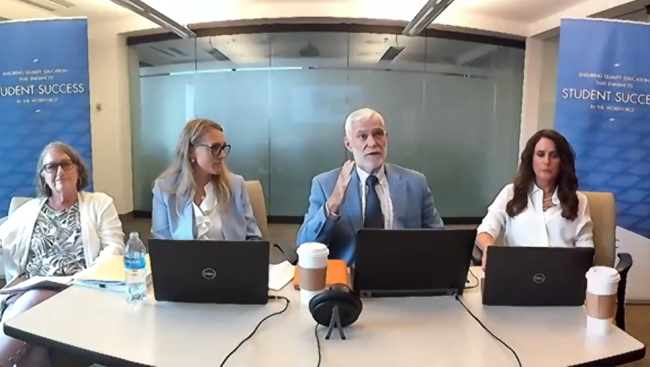You have /5 articles left.
Sign up for a free account or log in.

Representatives from ACCSC respond to questions from NACIQI members.
Screenshot
The committee in charge of making recommendations to the Department of Education regarding accrediting agencies broke from department staff’s recommendation for the renewal of the Accrediting Commission of Career Schools and Colleges, an agency that predominantly accredits for-profit career institutions and has come under fire for approving institutions with poor student outcomes.
Following hours of discussion and deliberation, the National Advisory Committee on Institutional Quality and Integrity, or NACIQI, voted Tuesday to recommend that a senior department official renew ACCSC’s federal recognition for three years. Department staff had recommended a five-year renewal.
“I personally cannot vote to support the recommendation of the department,” said Katherine Alioto, a member of the committee. “I think the agency presents a good PR presentation, but in terms of what’s actually going on in schools … I cannot vote in favor.”
Federal recognition allows accrediting agencies to accredit institutions so that they can access federal student aid funding to operate. ACCSC currently oversees 370 institutions that receive a total of $2.76 billion per year in Title IV funds, according to a report prepared for NACIQI.
Some members of NACIQI were pushing for a shorter renewal for the agency and a requirement for it to submit a compliance report. But the committee was unable to articulate the criteria on which ACCSC was noncompliant or a specific ask for the report.
“I really want to emphasize consistency,” said Jennifer Blum, a member of the committee. “What the department found was a pretty clean record. If we’re going to go through the process of doing one year here, we better nail down exactly what criteria we’re asking the agency to come back to.”
The committee couldn’t justify a substantially shorter renewal recommendation than the department’s, because most of the concerns raised about ACCSC by members of NACIQI were primarily related to student outcomes, which aren’t a part of the criteria for recognizing accreditors.
“Part of the reason there’s a lot of attention and commenters about ACCSC is that there are quite a few institutions that have come under law enforcement and other scrutiny that have been accredited by ACCSC,” said Robert Shireman, a member of the committee, citing the Center for Excellence in Higher Education, Vatterott College and Premier Education Group as examples.
Several third-party commenters spoke directly to the student outcomes at ACCSC-accredited institutions. Studies conducted by the think tank Third Way have shown that ACCSC institutions offer students no economic return on investment, said Michael Itzkowitz, a senior fellow at Third Way. Itzkowitz described a report that found 40 percent of all ACCSC institutions enrolled low-income students who were failing to earn as much as a high school graduate even 10 years after enrollment.
“Alarmingly, [ACCSC’s] stamp of approval too often leaves students worse off than if they hadn’t enrolled in the first place, especially for our most vulnerable students,” Itzkowitz said.
Marissa Alayna Navarro, a research assistant at the Center for American Progress, commented that NACIQI needed to take a closer look at ACCSC’s handling of the Center for Excellence in Higher Education, or CEHE, after it took 13 years to withdraw CEHE’s accreditation despite concerns about its colleges arising as early as 2008.
Representatives from ACCSC chose not to respond to the remarks made by the third-party commenters but described the measures the accreditor uses to evaluate institutions’ student outcomes -- including through student surveys -- and how it’s transparent about those outcomes by requiring colleges to make their graduation and employment rates available to prospective students.
“I’m not sure you’re going to find another accreditor that requires that,” said Michale McComis, executive director of ACCSC.
NACIQI’s three-day meeting will conclude Thursday with a policy discussion, in which members of the committee are likely to raise the policies that limited the scope of the accreditor review and prevented them from taking stronger action against ACCSC. For example, Shireman questioned the department’s accreditor-review process after the department said it doesn’t review tax forms or conduct Google searches to assess an accrediting agency.
“I think the issues being raised are critically important,” said Claude Presnell, acting chair of the committee. “If you think the staff needs to start looking at tax forms, those are recommendations that we can bring, but those are things that we’re going to need to talk about during the policy discussion.”




